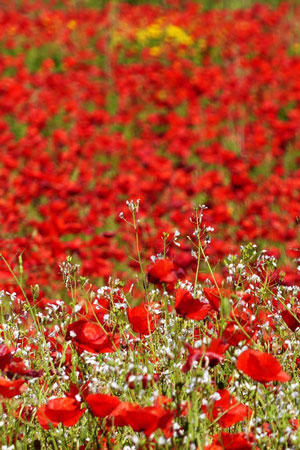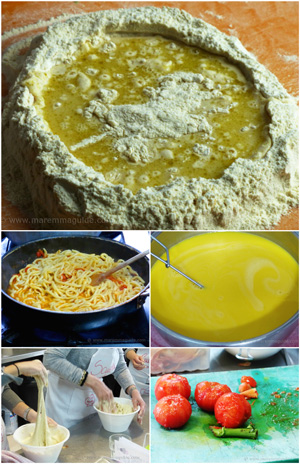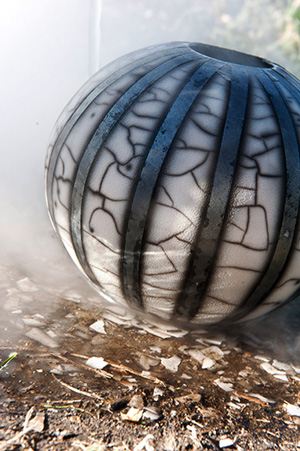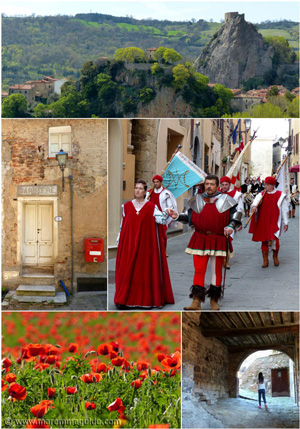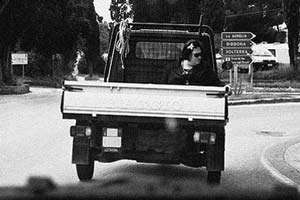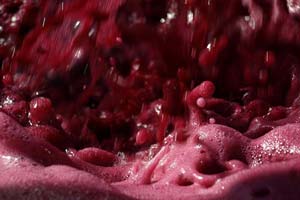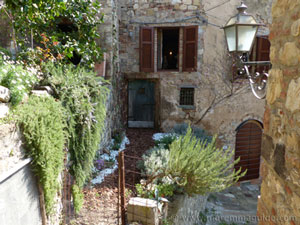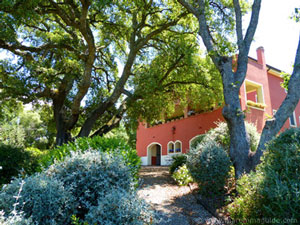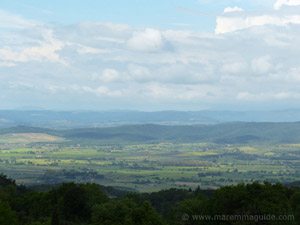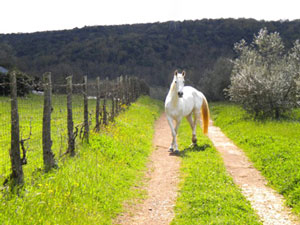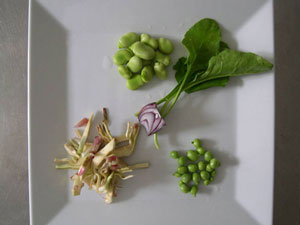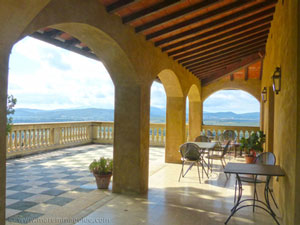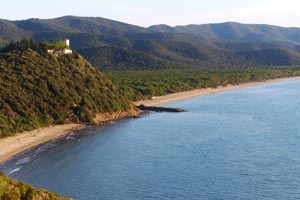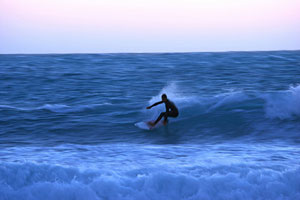The Castello di Montemassi
The Castello di Montemassi - Montemassi castle - is one of my favourite places to visit on a Sunday afternoon in Maremma: it is one of those places that I write about all of the time that are perfect for just sitting, staring, and imagining a time past.
All the while surrounded by stunning panoramic views of a Tuscany landscape that will take your breath away. It was once the home of the great and rich Salimbeni family of Siena whose perpetual war of vengeance with Siena's other great noble family, the Tolomei, left that city's streets covered in blood.
 The Castello di Montemassi with palace/castle keep and water cistern in the top left, and southern tower to the right.
The Castello di Montemassi with palace/castle keep and water cistern in the top left, and southern tower to the right. Whether you are a medieval history buff, a budding landscape photographer, or a youngster who loves clambering around and exploring castles, you will love this place. There are no tacky gift or souvenir shops, no neon lights, or any other bells and whistles. In fact, not even an information plaque or two as yet. Now that the castle's restoration works are complete, I hope that some will be placed there, for the castles history is - like all others in Maremma I have to say - full of tales of intrigue, sieges, wars, uprisings, demolition and abandonment.
What you will find today is just a castle ruin and its beautiful setting.
 The stunning aerial views above are the kite aerial photography work of Opaxir: see more of his wonderful KAP images of Maremma in this guide.
The stunning aerial views above are the kite aerial photography work of Opaxir: see more of his wonderful KAP images of Maremma in this guide.
Something for the kids: see if you can spot every letter of the Italian alphabet (there are 21) painted in red inside the walls of the castle: they are archaeoogical survey markers. Some are really easy to spot, but others aren't. Might just keep a few children tired of visiting Tuscan castles amused for a while :)
And the town of Montemassi is small and ever so quiet. Which is why, perhaps, others have left reviews in other web sites to say that there isn't much to see. But take a look for yourself.
The video
A little history
As with nearly all of Maremma's medieval castles, the castle at Montemassi changed hands a lot of times. But, perhaps as far as major historic events go, the most memorable time occurred in 1328 when the men of Montemassi gathered in revolt with the financial and political support of Castruccio Castracani of Antelminelli, against the occupying city of Siena. A long siege followed, and the strong Sienese army led by Guidoriccio of Fogliano re-took the castle.
The events are depicted in a celebrated fresco by Simone Martini - image below - which now hangs in the Palazzo Pubblico in Siena.
 |
Guidoriccio da Fogliano all'assedio di Montemassi by Simone Martini. |
Before 1328
The first records of the town date back to property titles of one Count Lldebrando in 1076. The 13th century sees the castle as one of the principal strongholds of the powerful Aldobrandeschi family in Maremma. Whereas in 1306 it was in the hands of the competing Pannocchieschi family.
 The view of Maremma's "colline metallifere" - metalliferous hills.
The view of Maremma's "colline metallifere" - metalliferous hills.
After 1328
After the 1328 siege, the Sienese Republic gave the castle as a feudal package to the once great and rich merchant Salimbeni family of Siena - one of the oldest families of Siena - who were embroiled in a perpetual "vendetta" (vengeance) war for the murders of family members by members of the other oldest family of Siena the Tolomei, and vice versa. They finally fell from grace with all of their possessions confiscated in 1419, but only after the whole of the city of Siena had became a battle field of bloody murders and the Pope had to send in support from Florence in an attempt to to bring civil rule back to the city.
 |
Castello di Montemassi: the square southern castle tower with its fine masonry, the castle curtain walls and internal courtyard |
But the Salimbeni lost the Castello di Montemassi forty-four years before then, in 1375 after an earlier rebellion against the Sienese Republic. And the castle became the property of the Verdelli family of Montalcino: one Mino Verdelli brought it for 800 Florins.
At the beginning of the fifteenth century, the city of Siena once again brought the castle within its territories and in 1404 decided to dismantle it to stifle the repeated attempts by the inhabitants of Montemassi to free themselves from the Republic's control and have Montemassi declared a free and self autonomous city.
With the fall of the Republic in the mid-sixteenth century, the castle became the property of Ferdinando II the Grand Duchy of Tuscany, who in 1632 gave it in fief to Marquis Giovanni Cristofani Malaspina of Mulazzo. The Marquis subsequently sold it in 1770 to the Marquis Domenico Cambiaso of Genova, with whom it fell into ruin.
Refreshments and parking

There's a bar/pizzeria/restaurant in a modern looking building at the base of the footpath to the castle - Il Guidoriccio - but I have to say it's not one that I'll choose to visit again.
The easiest place to park is in one of the spaces the piazza in town - you can't miss it as you drive in as there is an unusual sculpture on the bend - and then walk on up to the castle. Otherwise, even closer are spaces between the church of the Chiesa di Santa Maria delle Grazie and the aforementioned bar at the top of the hill, and then some in a large car park (never more than one car in it) down past the bar.
A note about wheelchair access to the castle. In short, there isn't any. The first stretch of pathway to the castle is wide, but is paved with large rounded boulders, which will make for a bumpy ride. The path then splits into two routes to the castle. The more suitable for wheelchair route is a concrete slab paved pathway: but it is steep and stepped. The other route is a footpath to the top of town that then turns onto open ground - where the paved pathway also finishes - for the remaining few metres to the castle. The true stumbling block, however, comes inside the castle where exploring further by wheelchair is impossible as the castle "floor" is the bedrock upon which it was built.
Places to stay

If you are looking for accommodation near the castle, then have I got something very special for you.
Behind the bell tower of the church in this photograph are the restored medieval and Renaissance apartments of Via di Corte. Blissful boutique apartments and bed and breakfast accommodation in pure, understated, Italian style. With a view. An incredible view.
Romantic places to stay in Maremma don't come any better than this.
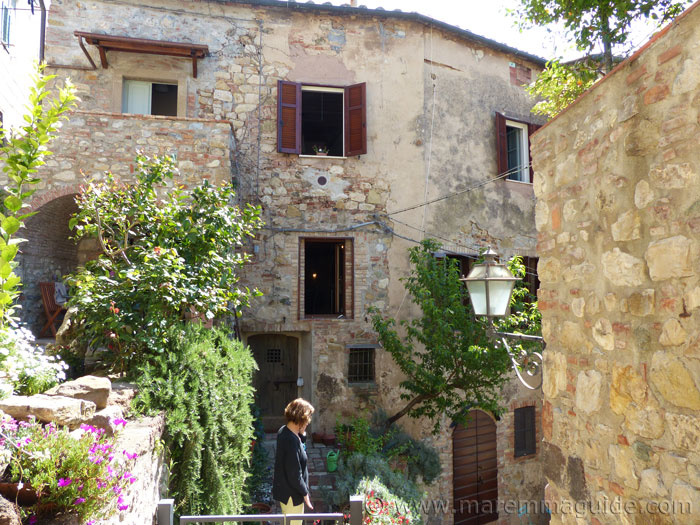
Explore Montemassi

Take a walk up and down and through the medieval streets of Montemassi.
Explore some more...
- Take a trip to nearby medieval Tatti with its own castle - you can see it from Montemassi castle - and try and solve the mystery of its doors.
